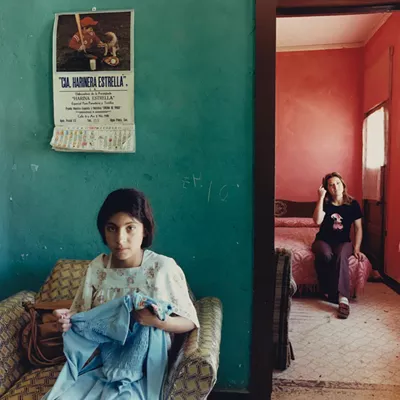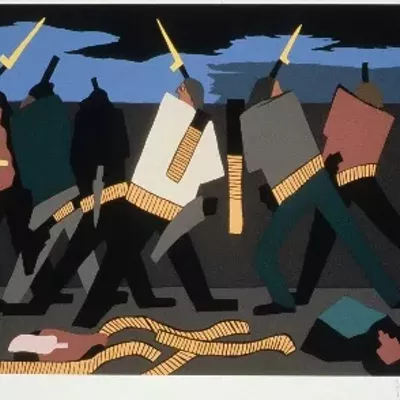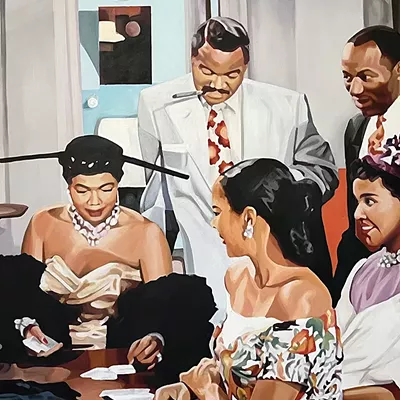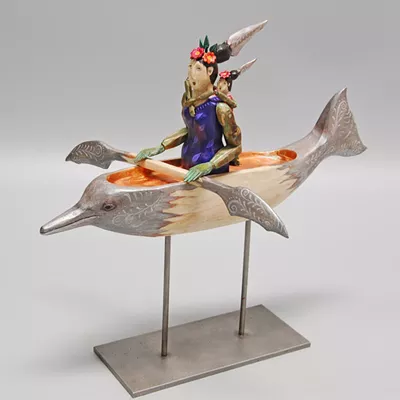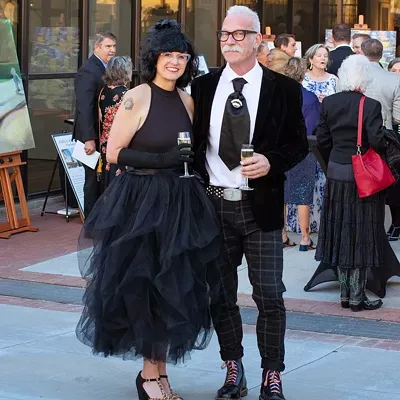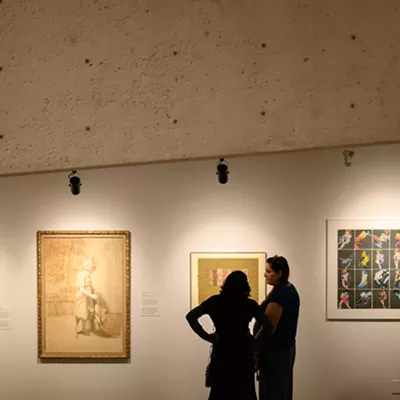When artist Tom Kiefer first started working as a part-time janitor at the Border Patrol station in Ajo back in 2003, he was shocked by the agency's practice of throwing out perfectly good canned foods they took away from captured migrants.
The boss, he says, told the agents they were not to waste time worrying about food.
"They were told that their job was to arrest people and bring them in." Period. "I thought it showed a callous disregard for people. I was disgusted."
Kiefer had moved to Ajo after 9/11 from L.A., where he had been working as a graphic designer and antiques dealer. He wanted to concentrate on his photography, and with Ajo's low cost of living, he was able to buy a house. And the job with Border Patrol was one of the best-paying gigs in town.
Still, Ajo is a low-income town and it bothered Kiefer to see food going to waste.
When a kinder, gentler chief was installed, Kiefer asked for permission to retrieve the food from the trash and take it to the community food pantry. The new boss not only said yes. Kiefer remembers, he said "bless you."
The change provided more food for hungry residents of the remote desert town, where the closing of the mines years ago laid jobs to waste. And Kiefer's new food duty accidentally enlightened him to another Border Patrol practice—and led him to an important new art series.
The agents, he discovered, routinely confiscated and discarded the belongings of captured migrants. Next to the cans of beans and unopened candy bars in the trash bins, Kiefer found medicine, photos of loved ones, bibles, backpacks, toothbrushes, wallets, children's toys.
"I saw everything," he says.
The stolen belongings made him "see" the migrants too. Earlier on in the job, he compartmentalized, never speaking to the border crossers when he came into their cells to empty the trash and mop the floors.
"I thought it was sad that people were forced to risk their lives to work" when they crossed the border and walked through the desert, he says. "But I looked at it as a job. I had not formed an opinion. And I didn't take the job to do an exposé."
The discovery of migrants' treasured belongings in the garbage pail disturbed Kiefer deeply. He began bringing the artifacts home, wondering what he should do.
"For the first six months, I was saying, 'What the fuck am I going to do with this stuff?' I was not going to let a rosary end up in the landfill."
Kiefer decided to evoke the migrants by photographing the articles that they once used.
But instead of placing just one object in each photo, he puts dozens and dozens of similar objects in the frame, each of them evoking the hundreds and thousands of migrants who have suffered in their pursuit of the American dream.
Etherton Gallery is showing more than 100 of Kiefer's heartbreaking photos. The large scale works beautifully display the stolen migrant belongings—and, by extension, honor their long-lost owners.
"Pink Combs and Brushes," an early work from 2014, is covered by nothing but the pink hair tools, elegantly arrayed. The piece conjures up the women who tamed their hair with those combs on their separate journeys. One can imagine them resuming the trek across the desert after tidying their hair, feeling hopeful that they were successfully fleeing poverty or violence in their countries—not knowing la migra would soon round them up.
Another image is filled to bursting with men's wallets, neatly placed row upon row. The wallets come in colors—yellow, red, tan—and Kiefer, a fine colorist, places them on a rich brown background. The purloined wallets testify to a cruel practice: the Border Patrol is known for tossing out migrants' ID' cards, which causes them no end of trouble when they are sent back across the border.
A beautifully pigmented piece features rich blue bibles on a golden cloth and an array of battered water bottles remind us remind us of the desert's dangers. Still another one has an infinity of gloves.
"A sea of gloves shows the mass of humanity," Kiefer says. The multiple objects in most of the works "convey the sheer volume of people" who pass through Border Patrol incarceration.
In recent years Kiefer has been working with portraits that he found in the trash can, and he's been experimenting with small-scale photos. But he found all the objects he works with between 2007 and 2014. Kiefer was working on the series during that time, but in 2014 he was ready to begin showing the works. He quit the janitor job and gave the Border Patrol a head's up about his Sueño series.
His house is still overrun with the artifacts he gathered in those seven years, and he works only with that material. Friends sometimes offer migrant backpacks or shoes they've found in the desert but Kiefer politely declines. He wants the work to be a specific archive that illuminates a point in place (in Border Patrol custody) and time (from 2007 to 2014)—and records what happened to migrants in those years. (Ajo and the western desert have long been hot spots for border deaths—in December 2020, five migrants lost there lives near Ajo and Organ Pipe National Monument.
His works, Kiefer writes in a note, tell the truths of "what was cruelly stripped from migrants and those seeking asylum, (and) the intentionally dehumanizing effect these policies have on those who come to "America" to seek a better life... This work is in part for the viewer to empathize and find common ground with those willing to risk their life for a better life."
El Sueño: Tom Kiefer, Alejandro Cartagena and a Selection of Mexican Folk Retablos
- Through Feb. 13
- Etherton Gallery, 135 S. Sixth Ave.
- 11 a.m. to 5 p.m., Tuesday to Saturday
- ethertongallery.com; 520-624-7370
- Masks required; no more than 10 visitors allowed at a time. Free.
EXTRA: The gallery will host a live-stream conversation, Border Stories, at 6 p.m., this Friday, Jan. 15, on Instagram.
Speakers include artist Tom Kiefer; Fancisco Cantú, author (A Line Becomes a River) and former Border Patrol agent; Dora Rodriguez, migrants rights advocate and survivor of a tragic 1980 border crossing that took many lives; and Jose Javier Zamora, poet and author (Unaccompanied) who writes about crossing the border.
Margaret Regan, a journalist and author (The Death of Josseline: Immigration Stories from the Arizona Borderlands and Detained and Deported: Stories of Immigrant Families under Fire), will moderate. The conversation will be followed by a short Q & A.
Follow the gallery's account, @ethertongallery, for updates. For more information, contact the gallery at info@ethertongallery.com or (520) 624-7370.
To see more of Tom Kiefer's work, visit artsy.net and search for Tom Kiefer


